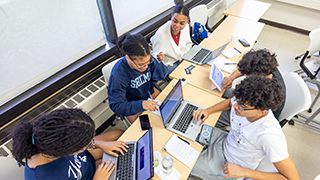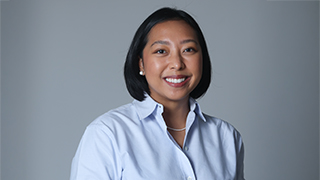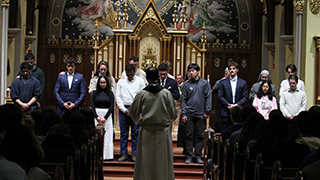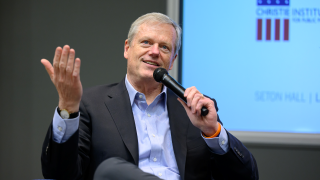Innovation, Energy and Collaboration Shine at Seton Hall’s Inaugural 24-Hour Hackathon
Monday, May 12, 2025
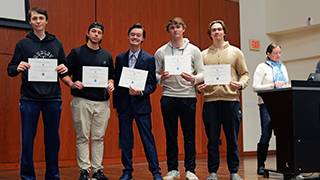 Jubilee Hall at Seton Hall University buzzed with creativity and collaboration during
the University’s inaugural 24-hour Hackathon, held April 12-13. The event brought together dynamic student teams, composed of
undergraduates and graduates from diverse academic backgrounds, to solve real-world
problems in fields ranging from cybersecurity and health to finance, international
development and sports innovation.
Jubilee Hall at Seton Hall University buzzed with creativity and collaboration during
the University’s inaugural 24-hour Hackathon, held April 12-13. The event brought together dynamic student teams, composed of
undergraduates and graduates from diverse academic backgrounds, to solve real-world
problems in fields ranging from cybersecurity and health to finance, international
development and sports innovation.
From the opening keynote by Seton Hall alumnus Stephen Ward ’98, to the final pitches delivered by the student teams, the Hackathon showcased the best of student ingenuity, cross-disciplinary teamwork and entrepreneurial spirit. Organized by the College of Arts and Sciences, Stillman School of Business and Division of Continuing Education and Professional Studies, the event was co-hosted by the student chapters of Institute of Electrical and Electronics Engineers (IEEE) and ACM Club and sponsored by Alan Kirshenbaum.
“It was thrilling to watch our students thrive under pressure and build solutions with real-world potential,” said Mary Kate Naatus, Ph.D., dean of the Division of Continuing Education and Professional Studies. “Events like this are key to experiential learning, leadership and preparing our students for the dynamic future of work.”
The winning team, Real Eyes AI, impressed the judges with a deepfake detection tool that uses AI to help users identify altered images and videos. The innovative, socially relevant solution, developed by team members Aaron Stanway, Brysen Pfingsten, Thorin Collins, Dimitri Short and Collin Delbridge, earned them the top cash prize.
“We really wanted to build something that tackled a problem people face every day,” said Short. “Deepfakes are becoming more common and dangerous. Knowing we could use what we’ve learned to help people protect themselves — and actually win with it — was incredibly rewarding.”
Second place was awarded to StatBridge, a duo consisting of international student-athletes Samuel Bjoerk and Axel Berglund, who developed a sports performance networking app that enables athletes to collect, share and track data and skill development on an accessible, affordable platform. Their project also embedded a social initiative called Project Rise, aimed at empowering promising athletes, especially refugees and marginalized athletes facing unique challenges. The duo was awarded gold Oura rings in recognition of their impact-driven innovation.
Other prize categories included iPads, gaming monitors and Ray-Ban Meta Glasses for teams recognized in categories such as Most Creative App, Best Security Solution, Outstanding Social Impact and Best Educational or Financial Tool.
Before the coding and brainstorming even began, the excitement was already in motion, as students across campus were invited to participate in a competition to design the official Hackathon T-shirt. Graphic design student Jessica Leppert won the contest and a cash prize for her eye-catching design, which was featured on all event swag.
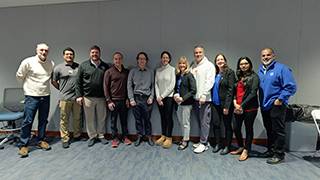 Behind the scenes, a dedicated committee of faculty and staff organizers including
Manfred Minimair; Mary Kate Naatus; Mark Schild, associate dean for Student Success,
Stillman School of Business; and Sandro Tejada, director of Development, Parents and
Families, University Advancement led planning efforts. On-site mentors include Victor
Gomez, Esports manager; Michael Dooney, associate dean, College of Arts and Sciences;
Mike Soupios, executive director, Teaching, Learning and Technology Center; and assistant
professors from the College of Arts and Sciences: Sivan Albagli-Kim, Shajina Anand,
Siyao Gu and Lucy Hsin-Yi Lin who provided guidance on both technical and strategic
aspects of project development.
Behind the scenes, a dedicated committee of faculty and staff organizers including
Manfred Minimair; Mary Kate Naatus; Mark Schild, associate dean for Student Success,
Stillman School of Business; and Sandro Tejada, director of Development, Parents and
Families, University Advancement led planning efforts. On-site mentors include Victor
Gomez, Esports manager; Michael Dooney, associate dean, College of Arts and Sciences;
Mike Soupios, executive director, Teaching, Learning and Technology Center; and assistant
professors from the College of Arts and Sciences: Sivan Albagli-Kim, Shajina Anand,
Siyao Gu and Lucy Hsin-Yi Lin who provided guidance on both technical and strategic
aspects of project development.
“This Hackathon was more than a competition,” said Manfred Minimair, Ph.D., faculty lead and professor of mathematics and computer science. “It was a community experience that emphasized creativity, teamwork and solving challenges that matter. The students far exceeded our expectations — we can’t wait to see what they’ll create next year.”
Held across Jubilee Hall’s auditorium, classrooms and lobby, the event also included pre-Hackathon workshops on AI, data science and design thinking. Seton Hall’s Esports Lab and comfortable lounges allowed participants to decompress, while local sponsors including BGR Burger, Kirschenbaum Baking Company, Sabatino’s and Gourmet Dining kept everyone energized with round-the-clock meals and treats.
As the final pitches wrapped up and judges Joshua Kirshenbaum, Robert Lee, Victor Gomez and Garret Chang ’09 deliberated, one thing became clear: Seton Hall’s Hackathon was not just a success, it was the launch of a new tradition. Students who are interested in joining the mailing list for the 2026 Hackathon, can visit our webpage.
Categories: Arts and Culture, Research, Science and Technology


